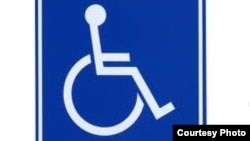HARARE —
Disabled children in Zimbabwe are failing to access basic human rights such as education and health that are enjoyed by their able-bodied colleagues, according to a new report released by the United Nations Children’s Fund (UNICEF).
The ‘World Children’s Report for 2013’ shows that many disabled children fail to realise their full potential as they struggle to access basic rights. The report notes that efforts by Zimbabwe soon after independence to improve the lives of people with disabilities were eroded by serious economic challenges.
According to UNICEF as many as 600,000 children are living with some form of disability in Zimbabwe.
Presenting the report findings, UNICEF’s child protection head in Harare, Lauren Rumble, said children with disabilities the world over face many challenges unlike their able bodied peers.
Rumble said the government and donor community should allocate more resources to the disabled community to ensure families are not pushed into abject poverty.
Also speaking at the launch of the report was Farai Gasa Mukuta of the National Association of Societies for the Care of the Handicapped (NASCOH).
Mr. Mukuta said the government should promote the rights of children living disabilities.
He said NASCOH is concerned that 52 percent of disabled children in Zimbabwe have no access to education, adding ablution facilities in rural areas are not accessible to the handicapped.
Mr. Mukuta said as a result disabled girls in the country are more vulnerable to sexual abuse.
He said professionals such as nurses, doctors, police officers and teachers should be taught sign language at training institutions to help meet the needs of disabled children.
Students, he said, were graduating with degrees and diplomas in special care from universities lacking sign language skills.
Special disability advisor to President Robert Mugabe, Brigadier General Felix Muchemwa, said the government needs more support from the donor community to go towards the realisation of children’s rights.
Panelists at a discussion after the launch were concerned by the lack of statistics about the exact number of people and children living with disabilities in Zimbabwe.
Panelists lamented the lack of government schools to cater for disabled children. Most parents cannot afford privately-run schools with facilities for the disabled.
UNICEF says the future of Zimbabwe’s 600,000 disabled children depends on government and civil society efforts to mobilize resources.
The ‘World Children’s Report for 2013’ shows that many disabled children fail to realise their full potential as they struggle to access basic rights. The report notes that efforts by Zimbabwe soon after independence to improve the lives of people with disabilities were eroded by serious economic challenges.
According to UNICEF as many as 600,000 children are living with some form of disability in Zimbabwe.
Presenting the report findings, UNICEF’s child protection head in Harare, Lauren Rumble, said children with disabilities the world over face many challenges unlike their able bodied peers.
Rumble said the government and donor community should allocate more resources to the disabled community to ensure families are not pushed into abject poverty.
Also speaking at the launch of the report was Farai Gasa Mukuta of the National Association of Societies for the Care of the Handicapped (NASCOH).
Mr. Mukuta said the government should promote the rights of children living disabilities.
He said NASCOH is concerned that 52 percent of disabled children in Zimbabwe have no access to education, adding ablution facilities in rural areas are not accessible to the handicapped.
Mr. Mukuta said as a result disabled girls in the country are more vulnerable to sexual abuse.
He said professionals such as nurses, doctors, police officers and teachers should be taught sign language at training institutions to help meet the needs of disabled children.
Students, he said, were graduating with degrees and diplomas in special care from universities lacking sign language skills.
Special disability advisor to President Robert Mugabe, Brigadier General Felix Muchemwa, said the government needs more support from the donor community to go towards the realisation of children’s rights.
Panelists at a discussion after the launch were concerned by the lack of statistics about the exact number of people and children living with disabilities in Zimbabwe.
Panelists lamented the lack of government schools to cater for disabled children. Most parents cannot afford privately-run schools with facilities for the disabled.
UNICEF says the future of Zimbabwe’s 600,000 disabled children depends on government and civil society efforts to mobilize resources.









